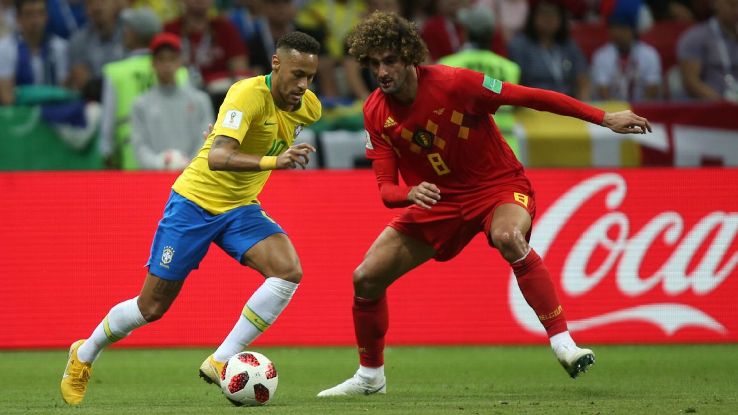


Stewart Robson challenges the FC crew to find a flaw in his best XI of France and Belgium players ahead of their clash in the World Cup semifinals.
Marouane Fellaini has done it. Regardless of what happens from here, he has helped Belgium to produce performances worthy of their potential. They were long known as the “Golden Generation” of players, noted for their rare elegance, but it is one of their least heralded players who has done much to elevate them.
How has Fellaini done this, and how much more effective can he be for United next season?
First questions first. History will record that Fellaini played an essential role as Belgium eliminated Brazil (who were superbly coached by Tite) from the tournament. As part of a midfield three, his role was to deal with the advancing Neymar, one he handled with diligence and aplomb. Fellaini is possibly world-class in two specific respects — his aerial threat and his chest control — but he is vital for one reason above all, which is that he does what he is told. There are more gifted players who he has displaced for both club and country, because he can almost always be trusted to deliver what is expected of him.
World Cup 2018 must-reads
– Make your daily ESPN FC Match Predictor picks!
– World Cup fixtures, results and coverage
– Belgium boss Roberto Martinez exclusive interview
– Semifinal questions for Belgium, France, England, Croatia
– How Fortnite, bowling and darts have helped England
– World Cups are the worst time to sign a player
Take that game against Brazil. It wasn’t the most convincing of performances overall from Belgium only because Brazil were so good that, after Belgium had a magnificent first half, Tite’s men mounted an onslaught in the second. Yet even as Belgium faltered Fellaini held firm, blocking one shot, making three tackles and winning seven headers. Neymar was arguably not at his sharpest but he didn’t have the guile to elude the far slower Fellaini with any consistency.
Fellaini has been much maligned during his time at United, and it’s easy to see why. He is antithetical to what some might describe as “the United way,” shorthand for a tradition of thrilling, highly technical attacking football. Yet it is also a great irony that some of Manchester United’s most exciting wins of late have come with him as one of the protagonists. Just look, for example, at Manchester United’s 4-2 win over Manchester City under Louis van Gaal.
The truth of the matter is that Fellaini is a supremely awkward opponent. Unless he is faced with a midfield so nimble that they can pass around him at will, or with a centre-back of equal height and reach, his impact can be devastating.
Of course Japan learned this to their cost when, leading Belgium 2-1 in the last-16, they saw Fellaini brought on to claim the equaliser. There he was sent on to provide aerial dominance, which he duly did, yet he also disrupted Japan’s rhythm, because now the game was played with a different tempo, with a different focus.
Put simply, Fellaini is very confusing to face. He is not as physically powerful as his frame suggests but is also more skilful than he first appears. These deceptive qualities make him extremely elusive at crucial moments in a game.
 Fellaini’s brilliance for Belgium at the 2018 World Cup showed why he’s still got a role to play for Man United next season, too.
Fellaini’s brilliance for Belgium at the 2018 World Cup showed why he’s still got a role to play for Man United next season, too.
The fact that Roberto Martinez trusted Fellaini to start against Brazil, who were the form team in the tournament going into that quarterfinal, is hugely significant. Martinez started him ahead of Moussa Dembele, who is more mobile, more technically gifted and more pugnacious — and, it must be remembered, he left Radja Nainggolan out of the squad altogether, such was his faith in the United man.
It speaks volumes, too, that Fellaini was probably his team’s best midfielder on the night, providing the platform upon which the fearsome trio of Eden Hazard, Kevin de Bruyne and Romelu Lukaku could surge forward on the break. Rather like, say, Massimo Ambrosini at AC Milan, Fellaini’s value to the team does not lie in his aesthetic qualities, but in his disruptive influence and underrated ability to push play forwards.
If Fellaini is good enough to start against Brazil in that sort of form, then there is no opposition of which he should be afraid. He can’t be accused of lacking confidence in his ability, having waited until the last moment to sign his new contract with United, and he has needed every bit of that self-belief in what has often been a difficult stay at Old Trafford. Yet if he can continue to refine his game, then United’s roster of reliable starting central midfielders is not as bare as it has often looked.
With a regular rotation of Fred, Nemanja Matic, Paul Pogba, Ander Herrera and an improved Fellaini, supported by Scott McTominay and one other addition, United would be reasonably well stocked going into next season. It would certainly be the most tactically diverse range of personnel in any Premier League squad.
“Fellaini-ball” may not be the easiest on the eye, and it has had its critics, but it is an enduring source of impressive results and should be a tremendous asset to United in months to come.
Musa Okwonga is one of ESPN FC’s Manchester United bloggers. Follow on Twitter: @Okwonga.

Be the first to comment